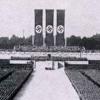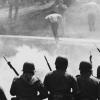Atlanta Congressman John Lewis Is the Nation's Conscience
Street Scribe
Civil rights champion and Georgia congressman John Lewis was diagnosed with cancer recently, and tributes have been pouring in for the man who has been called "the conscience of Capitol Hill." Pulitzer Prize-winning columnist Leonard Pitts went one better, calling Lewis "the conscience of the nation, the man who reminds us what it is we're supposed to be."
On Feb. 21, Lewis will celebrate his 80th birthday. It is appropriate that Lewis was born in February, the national Black History Month. Also born in February were African-American freedom fighters Frederick Douglass and Rosa Parks.
Douglass, the former slave who became a firebrand for freedom in 19th Century America, said, "Those who profess to favor freedom, and yet depreciate agitation, are men who want crops without plowing the ground. They want rain without thunder and lightning." Parks, who stood up for justice by sitting down in the whites-only section of a bus in Alabama in 1955, was called "the mother of the movement" for civil rights in the segregated South. She said, "I want to be remembered as a person who wanted to be free and wanted others to be free."
Both Douglass and Parks were role models for the young Lewis, who began his own crusade for freedom as a college student during the sit-in movement that protested segregation of lunch counters in the Jim Crow South. Beginning in Greensboro, NC, on Feb. 1, 1960, the sit-in movement swept across the region and captured the imagination of young activists like Lewis.
After the sit-in protests, Lewis became part of the Freedom Rides that aimed to desegregate interstate bus travel in the South in 1961. In 1963, Lewis addressed a movement multitude that surged into Washington for the freedom march when Martin Luther King Jr. gave his soaring and seminal "I Have a Dream" speech. In his own fiery speech that day, Lewis cried, "Wake up, America. Wake up! For we cannot stop and we will not be patient."
America did not wake up right away to its ingrown oppression of its black citizens. White supremacist jailings, beatings and bombings directed at black and white freedom fighters continued, and Lewis himself was nearly killed when he was severely beaten by police in Alabama during the "Bloody Sunday" voting rights protests there in 1965. “I really felt that I saw death at that moment," he recalled in his autobiography, Walking With the Wind. Today, John Lewis is the last surviving speaker from the historic 1963 march on Washington.
In 2003, Lewis spoke in Athens at the 25th annual Athens Human Rights Festival. I was honored to introduce him when he spoke to the downtown crowd. An early opponent of the Bush/Cheney administration's war in Iraq, Lewis thundered from the festival stage that he was committed to peace and justice at home and abroad. "I went to jail 40 times to help make our country a better place," he said of his nonviolent civil disobedience during civil rights and antiwar protests over a span of decades.
Throughout his long career at the barricades and in Congress, Lewis has petitioned not only for civil rights for this nation's black people, but also for equal rights for women and LGBTQ people and protection of a natural environment so often ravaged by plunder and plutocracy. He brought cheers from the Athens Human Rights Festival audience when he closed his speech by saying, "It doesn't matter whether we are black or white or Hispanic or Native American. We all live in one house. We are one people. We are one family. Our forefathers and foremothers all came to this great land in different ships, but we're all in the same boat now."
Lewis is a giant who walks among us, but when his "stride toward freedom" ends, his legacy will continue. Long before Lewis was born, a white activist named Ralph Chaplin, who was jailed in Chicago in 1917, wrote poetic words that apply to Lewis and the causes that he still fights for today: "Mourn not the dead that in the cool earth lie/ Dust unto dust/ The calm, sweet earth that mothers all who die/ As all men must/ …But rather mourn the apathetic throng/ The cowed and the meek/ Who see the world's great anguish and its wrong/ And dare not speak."
Keywords
More by Ed Tant
-

Study Shows Pandemics Can Give Rise to Fascism
Street Scribe
-

Six Plague Page-Turners to Read During the Pandemic
Street Scribe
-











comments